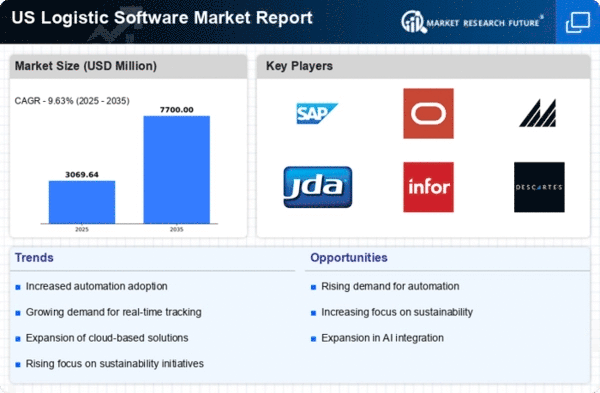Integration of Advanced Analytics
The integration of advanced analytics into logistic software is becoming increasingly prevalent, significantly impacting the logistic software market. Companies are leveraging data analytics to gain insights into their logistics operations, enabling them to make informed decisions. This trend is evidenced by the fact that around 60% of logistics firms in the US are adopting analytics tools to enhance their operational performance. By utilizing predictive analytics, organizations can forecast demand more accurately, optimize routes, and reduce operational costs. The ability to analyze vast amounts of data allows businesses to identify inefficiencies and implement corrective measures, thereby driving growth in the logistic software market. As the demand for data-driven solutions continues to rise, the integration of advanced analytics is expected to play a crucial role in shaping the future of logistics.
Focus on Sustainability Initiatives
Sustainability has emerged as a critical driver in the logistic software market, as companies strive to reduce their environmental impact. The increasing awareness of climate change and regulatory pressures are prompting organizations to adopt greener practices. Approximately 55% of logistics companies in the US are investing in software solutions that facilitate sustainable logistics operations. This includes optimizing transportation routes to minimize fuel consumption and implementing eco-friendly packaging solutions. As businesses prioritize sustainability, the demand for logistic software that supports these initiatives is likely to grow. This shift not only enhances corporate responsibility but also appeals to environmentally conscious consumers, thereby providing a competitive edge in the market.
Rising Demand for Supply Chain Visibility
The logistic software market is experiencing a notable surge in demand for enhanced supply chain visibility. Companies are increasingly recognizing the importance of real-time tracking and monitoring of goods throughout the supply chain. This trend is driven by the need for improved operational efficiency and customer satisfaction. According to recent data, approximately 70% of organizations in the US are investing in technologies that provide end-to-end visibility. This shift is likely to propel the logistic software market forward, as businesses seek solutions that enable them to respond swiftly to disruptions and optimize their logistics operations. Enhanced visibility not only aids in inventory management but also fosters better collaboration among stakeholders, thereby strengthening the overall supply chain ecosystem.
Growth of E-commerce and Last-Mile Delivery
The rapid growth of e-commerce is significantly influencing the logistic software market, particularly in the realm of last-mile delivery. As online shopping continues to gain traction, logistics companies are under pressure to enhance their delivery capabilities. Recent statistics indicate that e-commerce sales in the US have surged by over 30% in the past year, necessitating efficient logistics solutions. This trend is driving the demand for software that can optimize last-mile delivery processes, ensuring timely and cost-effective service. Companies are increasingly seeking logistic software that can manage complex delivery networks and provide real-time tracking for customers. As the e-commerce landscape evolves, the logistic software market is poised for substantial growth, driven by the need for innovative delivery solutions.
Emergence of Artificial Intelligence Technologies
The emergence of artificial intelligence (AI) technologies is reshaping the logistic software market, offering new opportunities for efficiency and innovation. AI applications, such as machine learning and automation, are being integrated into logistics operations to streamline processes and enhance decision-making. Approximately 50% of logistics firms in the US are exploring AI-driven solutions to improve their operational capabilities. These technologies enable predictive maintenance, route optimization, and demand forecasting, which can lead to significant cost savings. As AI continues to evolve, its impact on the logistic software market is expected to grow, potentially transforming traditional logistics practices into more agile and responsive systems. The integration of AI not only enhances operational efficiency but also positions companies to better meet the demands of a rapidly changing market.

















